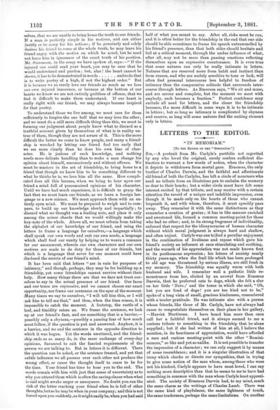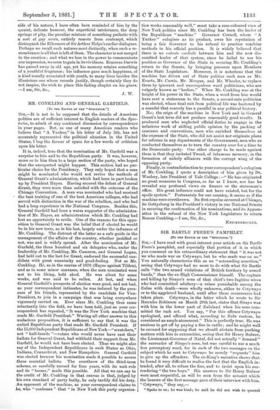LETTERS TO THE EDITOR.
"IN MEMORIAM."
[To THE EDITOR OF THE " SPECTATOB."] SIR,—A portrait from Mr. Carlyle's portfolio not regretted by any who loved the original, surely confers sufficient dis- tinction to warrant a few words of notice, when the character it depicts is withdrawn from mortal gaze. Erasmus, the only brother of Charles Darwin, and the faithful and affectionate old friend of both the Carlyles, has left a circle of mourners who need no tribute from an illustrious pen to embalm the memory so dear to their hearts ; but a wider circle must have felt some interest excited by that tribute, and may receive with a certain attention the record of a unique and indelible impression, even though it be made only on the hearts of those who cannot bequeath it, and with whom, therefore, it must speedily pass away. They remember it with the same distinctness as they remember a creation of genius ; it has in like manner enriched and sweetened life, formed a common meeting-point for those who had no other; and, in its strong fragrance of individuality, enforced that respect for the idiosyncracies of human character without which moral judgment is always hard and shallow, and often unjust. Carlyle was one to:find a peculiar enjoyment in the combination of liveliness and repose which gave his friend's society an influence at once stimulating and soothing, and the warmth of his appreciation was not made known first in its posthumous expression ; his letters of anxiety nearly thirty years ago, when the frail life which has been prolonged to old age was threatened by serious illness, are still fresh in my memory. The friendship was equally warm with both husband and wife. I remember well a pathetic little re- monstrance from her, elicited by an avowal from Erasmus Darwin, that he preferred cats to dogs, which she felt a slur on her little Nero ;' and the tones in which she said, "Oh, but you are fond of dogs ! you are too kind not to be," spoke of a long vista of small, gracious kindnesses, remembered with a tender gratitude. He was intimate also with a person whose friends, like those of Mr. Carlyle, have not always had cause to congratulate themselves on their place in her gallery, —Harriet Martineau. I have heard him more than once call her a faithful friend, and it always seemed to me a curious tribute to something in the friendship that he alone supplied ; but if she had written of him at all, I believe the mention, in its heartiness of appreciation, would have afforded a rare and curious meeting-point with the other "Remini- scences," so like and yet so unlike. It is not possible to transfer the impression of a character ; we can only suggest it by means of some resemblance ; and it is a singular illustration of that irony which checks or directs our sympathies, that in trying to give some notion of the man whom, among those who were not his kindred, Carlyle appears to have most loved, I can say nothing more descriptive than that he seems to me to have had something in common with the man whom Carlyle least appreci- ated. The society of Erasmus Darwin had, to my mind, much the same charm as the writings of Charles Lamb. There was the same kind of playfulness, the same lightness of touch, the same tenderness, perhaps the same limitations. ' On another
side of his nature, I have often been reminded of him by the quaint, delicate humour, the superficial intolerance, the deep springs of pity, the peculiar mixture of something pathetic with a sort of gay scorn, entirely remote from contempt., which distinguish the Ellesmere of Sir Arthur Helps's earlier dialogues. Perhaps we recall such natures most distinctly, when such a re- membrance is all that is left of them. The character is not merged in the creation ; and what we lose in the power to communicate our impression, we seem to gain in its vividness. Erasmus Darwin has passed away in old age, yet his memory retains something of a youthful fragrance ; his influence gave much happiness, of a kind usually associated with youth, to many lives besides the illustrious one whose records justify, though certainly they do not inspire, the wish to place this fading chaplet on his grave. —I am, Sir, &c., J. W.



































 Previous page
Previous page